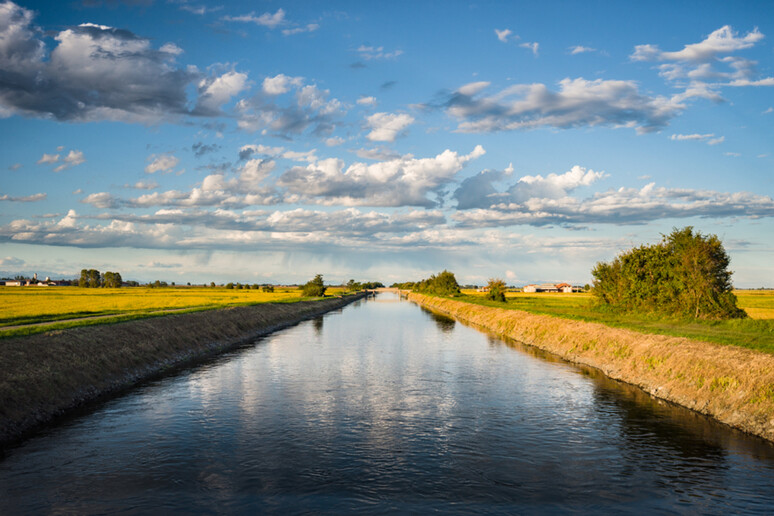Water is everywhere, and most of the
time, Europeans don't really ponder this essential part of their
lives much. But climate change, agriculture, pollution and
overuse are putting a strain on water systems on the continent -
be it freshwater, oceans or even wastewater.
The EU has launched a raft of policies in an attempt to get a
clearer picture on the state of water in the Union and to shape
its upcoming Water Resilience Strategy.
This week the Commission released reports on the implementation
of the Water Framework Directive, the Floods Directive, and the
Marine Strategy Framework Directive.
In this article, the enr is looking into how countries in
different parts of the EU are affected by the issues highlighted
in the reports and - in a separate part of this - will also dive
into the Urban Wastewater Directive, which entered into force in
January.
In the Commission's report on the implementation of the Water
Framework Directive it was said that things got better. "Member
States have generally improved knowledge and monitoring of
surface and groundwater bodies, increased spending, and improved
the application of EU water-related legislation, though there
are considerable regional differences," it was pointed out.
Across the board, a change in mindset was needed when it comes
to accessing water, Commsissioner Roswall told the Bulgarian
news agency BTA. "Water is no longer business as usual. It is a
strategic resource for our security."
But member states still have their work cut out to meet the EU's
targets, with only 39 percent of surface water bodies achieving
good ecological status, and only 26.8 percent achieving good
chemical status. This was mainly due to widespread contamination
by mercury and other toxic pollutants, the Commission added.
Floods, water scarcity and drought were also growing concerns.
No smooth waters
Member States are asked to adhere to pollution levels and ensure
that wastewater is being dealt with properly by 2027. They are
to promote water reuse, combat illegal extraction and increase
efficiency, among other things. However, at this point it seems
unlikely for the states to achieve these objectives by 2027, the
report said.
Roswall stressed that EU water legislation was in place, but its
implementation was lagging. To close that gap, she announced
structured dialogues with every EU country.
Countries such as Belgium are nowhere near reaching the goals of
the framework directive on water by 2027. There is widespread
pollution from agriculture and industrial activities and dense
population - canalisation and historic (that is long-term) and
cross border pollution also add pressure.
In Belgium, only 27.4 percent of surface waters had a good
ecological status with the presence of nitrates and pesticides
remaining a major concern. Additionally, all surface waters were
in poor chemical status, mainly due to mercury, synthetic
chemicals like Per- and polyfluoroalkyl substances (PFAS) and
metals such as lead and cadmium. The chemical status of
groundwater improved slightly compared to the 2015 measurement,
but still almost half of groundwaters are in a bad situation.
According to European sources, seven member states, among them
Portugal, that have not submitted updated strategic plans on the
application of the Water Framework Directive and the Floods
Directive will be brought before the Court of Justice of the
European Union.
Expect bickering and challenges: The Portuguese government for
example has said that the data that led the European Commission
to put Portugal in court for inadequate measures in relation to
water and flooding is out of date, according to the Environment
Ministry.
Droughts and water scarcity are putting the EU's water reserves
to the test, while the risk of increased flooding is considered
high. Despite the progress observed in the Commission's
assessment of the implementation of the Floods Directive on
flood risk management, Brussels recommends that capitals improve
their planning and administrative capacity and invest adequately
in flood prevention.
"Floods are becoming more frequent, more intense, and more
deadly. No part of Europe is spared. Investing in flood
prevention and early warning systems is key to achieve this,"
Roswall said.
Yet most of member states' plans made drawing conclusions on
their effectiveness difficult due to a lack of quantitative
targets.
Austria for example was asked to make the objectives of the
national plan more specific, to link them to quantitative
indicators where possible and to set a time limit. It must also
assess its progress in achieving the objectives. It should also
increase and accelerate its measures to restore a good
ecological and chemical status of all rivers and lakes, the
report stated. "Diffuse pollution from agriculture! in the
waters must be better assessed and directly reduced, it added.
Belgium is one of the countries that needs to do more on flood
management, Roswall emphasised. Flood risks are significant
across the Belgian regions, as became painfully clear during the
summer of 2021, when floods ravaged parts of the province of
Liège. Over the past years, floods have also laid waste to parts
of Germany, the Netherlands, the Czech Republic, Spain, Poland
or Austria, to name some.
(continues)
ALL RIGHTS RESERVED © Copyright ANSA











